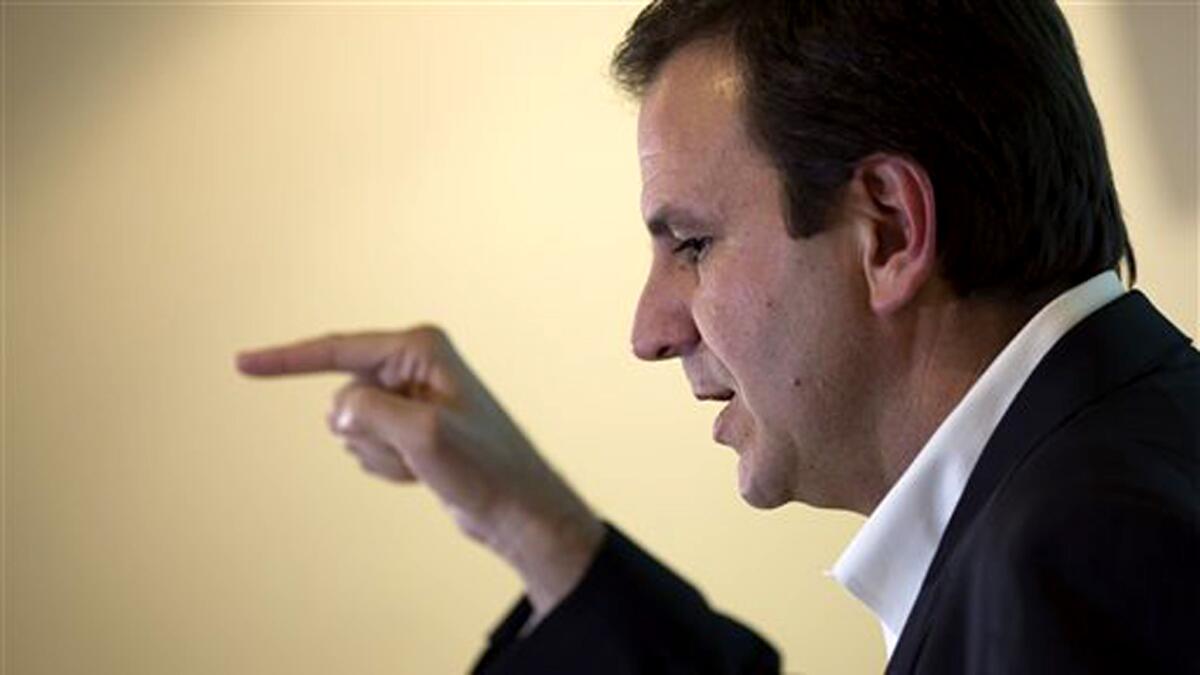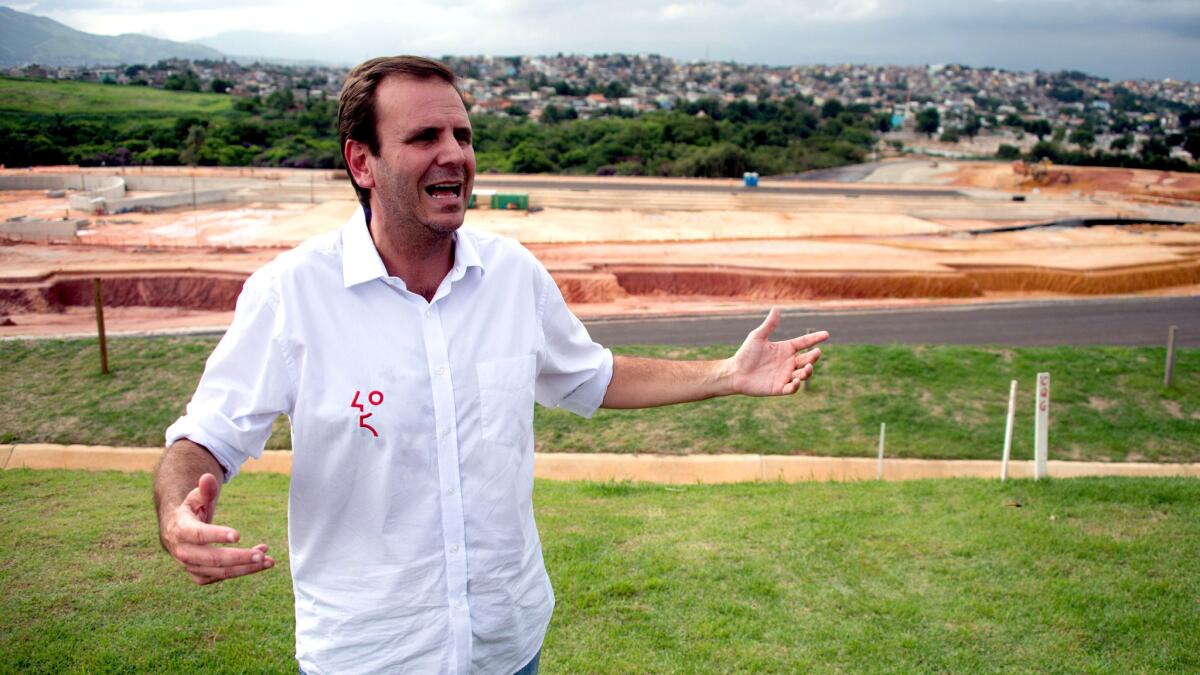Listen up, L.A.: Rio de Janeiro’s mayor shares advice on the Olympics

Rio de Janeiro Mayor Eduardo Paes discusses the World Cup soccer tournament during a news conference on June 5, 2014.
Eduardo Paes will take the stage as the most important mayor in the world for 17 days next year when the Summer Olympics start in August in his city of Rio de Janeiro. For him, the nine-year adventure officially started Sept. 7, 2007, when Rio was named Brazil’s applicant city. At the time, Paes was the secretary of tourism, sport and recreation for the state of Rio de Janeiro.
It’s the same time frame facing Los Angeles in its bid to be the host Olympics city in 2024 — although Los Angeles had more of a struggle, becoming the U.S. bid city only after Boston had been chosen and later pulled out over financial concerns.
Paes, 46, became mayor in 2009, and he made the final venue presentation to the International Olympic Committee later that year. Rio won the vote over Madrid, Tokyo and Chicago as the Olympics were awarded to South America for the first time.
Paes, a charismatic and energetic speaker, has been a vocal ambassador for Rio since it was awarded the Games. He is never short of opinion or advice and shared experiences that may well face L.A. Mayor Eric Garcetti, should Los Angeles win the 2024 Games. At the center of his message is the spending of public money as opposed to private funds, a discussion point in the L.A. bid.
In an hourlong interview with a small group of U.S. reporters at Palacio da Cidade, the mayor’s office, Paes spoke almost entirely in English. His answers have been edited for clarity and brevity. In some cases the questions were tailored to better capture his responses.
What kind of stress levels do the Olympics cause the mayor?
Every day you get a president of an international federation or Brazilian federation complaining about something. … Like the issue we had with the swimming federation a month ago. They want us to cover the stadium where diving is going to happen. It was never supposed to be covered but then they decided it was supposed to be covered. The cost would be 1.5 million real [the Brazilian currency; a real is worth about 25 cents], then when we check the price it’s 20 million real. And there is no need to do it.
Is the criticism of Brazil’s being behind schedule fair?
I think it was exaggerated but completely comprehensible. Brazil was two, three months from the World Cup. The opening ceremony stadium wasn’t ready yet in Sao Paulo. Especially when you come from foreign countries [you think] these guys aren’t going to get things done.
There is a … mistrust in the Brazilian capability to deliver things, which makes my life harder.
How do you reconcile the cost of the Games?
It has been clear to me since we won [the bid] that in a country like Brazil, with so much [economic] contrast, that people would not understand the city spending taxpayer money to build a golf course, to build an aquatics stadium, to build a handball stadium. This will not go easy on people’s minds. If it goes like it did in Boston, can you imagine what happens in Rio?
So we went to lots of partners, private partnerships. … I knew [getting] federal money to Rio is very slow. It would not be easy to get this money. And the city had to spend its money on legacy, on what is necessary for the people.
Is it worth it and what would you say to bid cities?
Go for it. … I went to Barcelona right after we won the Olympic bid. I wanted to talk to [former mayor] Pasqual Maragall, the guy who won the bid, and wanted his advice. He said there are two kinds of Olympic Games. The one that uses the city and the [one in which the] city uses the Games. Barcelona used the Games to transform itself. So this became like a mantra for us. Every opportunity I had to use the Olympics to help the city I did. The IOC is not FIFA. When we won the bid we won because of the legacy.
They are always looking for legacy, but by the end the day, it’s all about the sports. [The IOC] obviously cares much more about the venues, about the accommodations, the Olympic family, this and that.
I’m probably going to get in trouble, but I’ll say it anyway. It’s impossible to ask every city to deliver this thing called the IBC [International Broadcast Center]. It’s crazy. … It’s too expensive. It’s too big. You find a solution like we did here — a private solution. If I had done like London did and spent public money — it cost like 500 million pounds [for the IBC]. Here in Brazil [if we do that] we go to jail. So we found a proper solution using private money.
I ask you to compare Rio with Rio. It’s not fair to come here and think it’s up to the Olympics to solve all the problems. That was never the deal. We want the Olympics to make our city better. In big cities like Rio and Sao Paulo we’ve got a long, long, long, long way to go. It’s going to take a little longer than I thought. But I think cities should go for it.
How will you measure how successful the Games are?
We did not bring the Olympics or World Cup here because of the party. Everybody knows Brazilians throw great parties. Come to Carnival every year and you’re going to see the most organized mass [of people] in your life. So I knew the World Cup would do great and I know the Olympics will do great. The Olympics is an opportunity for a country to showcase itself. It’s an opportunity for us to show that we can do things in the right way. A physical and tangible legacy.

Rio de Janeiro Mayor Eduardo Paes talks to reporters in April at the site of the Olympic Park.
When you look at downtown Rio you see the renovation of the port area. You know they say a city without a downtown is a city without a soul. This is a great transformation. At the same time as we use so much private money, the city was able to deliver 331 schools during this Olympic journey. The primary healthcare went from 3.5% of [people having] coverage, it’s now 55% and goes to 70% next year.
How involved is the mayor in the running of the Games?
I don’t want to know about the food of the athletes. I don’t want to know about the hotel of the Olympic family. I don’t want to know about the ball they are going to use in basketball. These are not my problems.
But from a city perspective, this is my problem. From the operation of the city, this is my responsibility. I think it’s normal that mayors play important roles. … This is a big thing for the country but it’s enormous things for us in the city. So it’s a big opportunity and mayors will always be more connected to the Games than other levels of government.
We work pretty closely with the organizing committee. I think we have a very professional organizing committee. They are in the mood of saving money. Let’s not make any debt. This is good. …
If you look at the price of [our] Olympic Stadium, and if you look at the Olympic Stadium in London, they spent more public money then we are in all our venues.
What do you think the World Cup’s legacy was here?
I don’t think the World Cup changed the way you gringos think about Brazil. It’s like, these guys, they throw great parties.
Stadiums started at costs of 10, when they were ready they were at 20 or 30. Two or three times higher. There are some white elephants that aren’t going to be used. There are lots of things that took awhile to get ready. By the end of the day, it was much better than the international media expected.
What advice would you have for the mayors of Los Angeles or Paris? Was there something you just didn’t think of that could become an issue or a problem?
Get some advice. [You need to] get the Games to transform the city. [Pasqual Maragall] told me, “Do what you’ve got to do because they won’t take the Games from you.”
So do what you got to do, like when we had the April crisis last year. [Some were saying] we are thinking about taking the Games out of Rio. I didn’t lose one night of sleep over that since Maragall told me that.
At a certain moment they will say we are not going to do a Games in the city. But do what you’ve got to do because they will not be able to take the Games from you. That’s how it often is. I would always think first of the city. … Deliver a good Games. Deliver good things but the first thing is it’s always about your city. At least that’s the mayor’s role, to protect the city, always, always.
Do you think the Games are just too big, too bulky for a city to handle?
When you look at the figures, you can do the Games without doing crazy things. Let me give you an example. In the velodrome ... I went to the details and asked why does a temporary stadium have to have ceramic toilets. It’s temporary. Fifteen days. So I became a specialist about toilets at the London Games.
So the velodrome has two underground levels. So I say, “Why do you need two underground levels in a velodrome?” I can’t understand that. “It’s at the request of the IOC,” I’m told. So if you don’t push a little bit harder you will accept that.
If you need two, I’ll do it. But if you don’t, why is it necessary? So when I went to a higher level they say, “We never asked for that.” This is something that came from Brazil. By the end of the day, what you realize is that there are some crazy requests, there are some things that need to change but by the end of the day there is the craziness of the host country. The craziness of the whole city. The people who think what they need to do needs to be fancy. I think we helped them in that sense.
Twitter: @jcherwa
More to Read
Go beyond the scoreboard
Get the latest on L.A.'s teams in the daily Sports Report newsletter.
You may occasionally receive promotional content from the Los Angeles Times.











